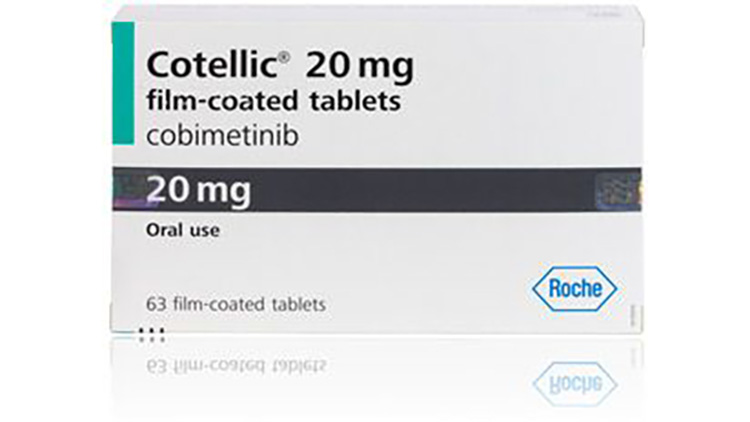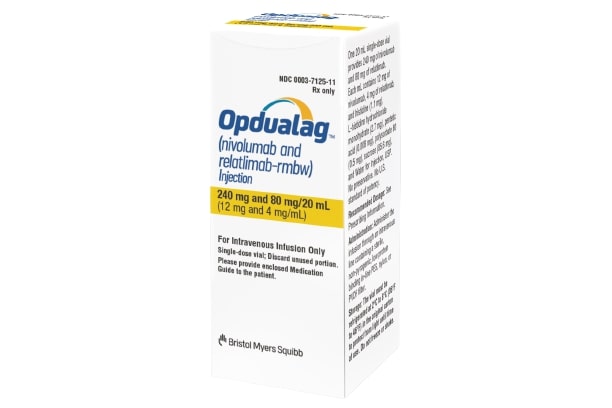Cotellic (cobimetinib) vs Opdualag (nivolumab & relatlimab)
Cotellic (cobimetinib) vs Opdualag (nivolumab & relatlimab)
Cotellic (cobimetinib) is a targeted therapy known as a MEK inhibitor used primarily in combination with another medication called vemurafenib for the treatment of certain types of advanced melanoma with a specific genetic mutation (BRAF V600E or V600K). Opdualag, on the other hand, is a combination of two immunotherapy drugs, nivolumab and relatlimab, which work together to enhance the body's immune response against cancer cells. When deciding between these treatments, it is crucial for a patient to discuss with their healthcare provider the specifics of their melanoma, including genetic mutations and overall health, as these factors can significantly influence the effectiveness and suitability of the treatment.
Difference between Cotellic and Opdualag
| Metric | Cotellic (cobimetinib) | Opdualag (nivolumab & relatlimab) |
|---|---|---|
| Generic name | Cobimetinib | Nivolumab and Relatlimab |
| Indications | Used in combination with vemurafenib for the treatment of patients with unresectable or metastatic melanoma with a BRAF V600E or V600K mutation. | Indicated for the treatment of adult and pediatric patients 12 years of age and older with unresectable or metastatic melanoma. |
| Mechanism of action | MEK inhibitor, which works by inhibiting mitogen-activated protein kinase enzymes MEK1 and MEK2. | Combines two immune checkpoint inhibitors: Nivolumab, a PD-1 inhibitor, and Relatlimab, a LAG-3 inhibitor. |
| Brand names | Cotellic | Opdualag |
| Administrative route | Oral | Intravenous |
| Side effects | Diarrhea, photosensitivity, nausea, fever, vomiting. | Fatigue, musculoskeletal pain, rash, diarrhea, pruritus. |
| Contraindications | None known beyond hypersensitivity to cobimetinib or any of its excipients. | None known beyond hypersensitivity to nivolumab, relatlimab, or any of their excipients. |
| Drug class | Antineoplastic agent, MEK inhibitor | Antineoplastic agents, Immune checkpoint inhibitors |
| Manufacturer | Genentech, Inc. | Bristol-Myers Squibb |
Efficacy
Efficacy of Cotellic (Cobimetinib) for Skin Cancer
Cotellic (cobimetinib) is a medication that has been approved for use in combination with another drug called Zelboraf (vemurafenib) for the treatment of a specific type of skin cancer known as melanoma. This combination is specifically indicated for patients with melanoma that cannot be removed by surgery or has metastasized, and whose tumors express a gene mutation called BRAF V600. Cobimetinib is a type of drug known as a MEK inhibitor, which works by interfering with the MEK proteins involved in the growth and spread of cancer cells.
The efficacy of cobimetinib in treating skin cancer has been demonstrated in clinical trials. In a pivotal Phase III trial, the combination of cobimetinib and vemurafenib was shown to significantly improve progression-free survival compared to vemurafenib alone. Patients treated with the combination therapy experienced a median progression-free survival of 9.9 months, compared to 6.2 months for those receiving vemurafenib alone. Additionally, the combination therapy led to a higher response rate, meaning that more patients experienced a reduction in tumor size.
Efficacy of Opdualag (Nivolumab & Relatlimab) for Skin Cancer
Opdualag is a combination of two immunotherapy drugs, nivolumab and relatlimab, that has been developed for the treatment of melanoma, a type of skin cancer. Nivolumab is a PD-1 inhibitor, while relatlimab targets the LAG-3 immune checkpoint. Both drugs work by enhancing the body's immune response against cancer cells. This combination is designed to provide a dual blockade of these immune checkpoints, potentially leading to a more effective antitumor response.
The efficacy of Opdualag in treating melanoma has been evaluated in clinical trials. In a Phase II/III trial, the combination of nivolumab and relatlimab showed a significant improvement in progression-free survival compared to nivolumab alone in patients with previously untreated metastatic or unresectable melanoma. The trial demonstrated that the addition of relatlimab to nivolumab reduced the risk of disease progression or death, indicating that the combination therapy may provide a more robust and durable response in the treatment of melanoma.
Regulatory Agency Approvals
Cotellic
-
European Medical Agency (EMA), European Union

-
Food and Drug Administration (FDA), USA

-
Therapeutic Goods Administration (TGA), Australia

Opdualag
-
European Medical Agency (EMA), European Union

-
Food and Drug Administration (FDA), USA

Access Cotellic or Opdualag today
If Cotellic or Opdualag are not approved or available in your country (e.g. due to supply issues), you can access them via Everyone.org.
How it works

Make an enquiry
Choose the medicine you want to buy, answer a couple of questions, and upload your prescription to speed things up. We’ll get back to you within 24 hours.


Make an enquiry
Choose the medicine you want to buy, answer a couple of questions, and upload your prescription to speed things up. We’ll get back to you within 24 hours.


Breeze through the paperwork
We'll guide you through the required documents for importing unapproved medicine, ensuring you have all the necessary information.


Get a personalized quote
We’ll prepare a quote for you, including medicine costs and any shipping, administrative, or import fees that may apply.


Receive your medicine
Accept the quote and we’ll handle the rest - sourcing and safely delivering your medicine.

Some text on this page has been automatically generated. Speak to your physician before you start a new treatment or medication.
Let's talk
If you have any questions, call us or send us a message through WhatsApp or email:
Contact us




